JUSTIFIED BY FAITH WITHOUT THE DEEDS OF THE LAW
Rom 3:28 Therefore we conclude that a man is justified by faith without the deeds of the law.
What does the previous verse mean? First of all “without” is from the Greek khorece, which means separately or apart, besides, by itself.
So we have a clear separation between justification and works (deeds).
Before we continue, in our previous post, we showed that all covenants of the Most High are forever and therefore none is “done away.” We showed that they work together, building upwards from a foundation and bringing us to the new covenant in the Messiah.
Let us now highlight what comprises our 3-part series:
- First post (Bible Covenants Explained) looks at the nature of YAHUAH’S eternal covenants.
- Second post (this one) looks at what purpose the law covenant serves for a new covenant believer.
- Part 3 shows what part of the law is decayed and ready to wax old according to Hebrews 8:13.
If you prefer to listen, our podcast episode explaining what Paul means by being justified by faith without the deeds of the law is posted at the top of this article.
JUSTIFICATION BY THE LAW?
So what we are going to look at today, is the function of the old covenant in a new covenant believer’s life. Of course, this may sound ludicrous to some Christians who believe we must have nothing to do with the law, or we are fallen from grace.
Gal 5:4 Messiah is become of no effect unto you, whosoever of you are justified by the law; ye are fallen from grace.
However, if you look carefully (Christians never seem to look carefully) what Sha’ul was speaking about is justification! This word forms the core of this post today. Ignoring the meaning of this word in Sha’uls teachings will lead us to totally misunderstand what he was trying to say!
So, we shall soon see the importance of this understanding.
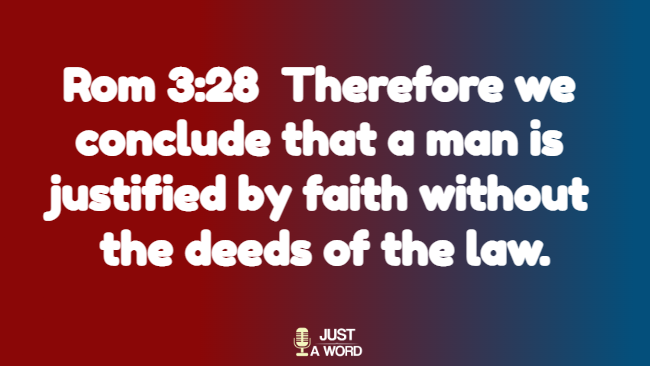
SHALL WE SIN BECAUSE WE ARE NOT UNDER THE LAW?
However, on the other hand, they willingly ignore this statement that also came from Sha’ul:
Rom 6:15-16 What then? shall we sin, because we are not under the law, but under grace? YAHUAH forbid. Know ye not, that to whom ye yield yourselves servants to obey, his servants ye are to whom ye obey; whether of sin unto death, or of obedience unto righteousness?
Sha’ul was saying there that even though we are not under the law but under grace, we still cannot live in sin. Why? If we live in sin we will die (not have eternal life).
So this is the paradox we will choose to sort out. In the end, we will answer the question: “What is the purpose of the law for a new covenant believer?”
To solve this, we have to first listen to Apostle Sha’ul and let him tell us what the law does not do for us in the new covenant.
JUSTIFIED BY FAITH WITHOUT THE DEEDS OF THE LAW: THE LAW DOES NOT JUSTIFY US
So we begin by looking a little bit closer at justification. We had earlier looked at Gal 5:4 where Sha’ul said we are not justified by the law.
So what does the word justify mean?
Justify: to show or render as just or innocent, be righteous.
So in other words, the law cannot render us just or righteous. But we shall see that:
-
- The law is very integral in the process of righteousness
- We will eventually show what is needed for our justification
So let us look at this verse:
Rom_3:20 Therefore by the deeds of the law there shall no flesh be justified in his sight: for by the law is the knowledge of sin.
There are two parts to that verse that we will look at.
- By the deeds of the law there shall no flesh be justified in his sight
- By the law is the knowledge of sin
So first, here Sha’ul gets a little more specific and says we cannot be justified by the DEEDS OF THE LAW. Now, what does this mean?
DEEDS OF THE LAW (ANIMAL SACRIFICE?)
The deeds of the law speak of work on our part. Take a look at the definition:
English: deed
Greek: ἔργον érgon, er’-gon;
from a primary (but obsolete) ἔργω érgō (to work); toil (as an effort or occupation); by implication, an act:—deed, doing, labour, work.
Some believers (including most of the Hebrew Israelites) teach that THE DEEDS OF THE LAW refers to animal sacrifice.

However, by using looking at the meaning of the word and using precepts, we see these deeds did not refer to animal sacrifice.
How do we know this?
We find the clue in Romans 3:27 to show “the deeds of the law” is not only referring to animal sacrifice. This is when Sha’ul actually speaks of boasting when it comes to the deeds (works) of the law:
Rom 3:27 Where is boasting then? It is excluded. By what law? of works? Nay: but by the law of faith.
Now if the “deeds” referred to animal sacrifice, what is there to boast in? Can I boast to someone that I am sacrificing a goat for my sins? Can I boast that I have to go to the high priest to atone for my sins?
No, boasting was manifested in showing off law-keeping by something we do that can be boasted about. We know that this was what the biblical Pharisees did and what the modern Pharisees of Judaism do.
We get more understanding of this when we look more carefully at the definition of deeds.
English: deed
Greek: ἔργον érgon, er’-gon;
from a primary (but obsolete) ἔργω érgō (to work); toil (as an effort or occupation); by implication, an act:—deed, doing, labour, work.
As we can see, it speaks of effort. It doesn’t take much effort to bring an animal to the High Priest to be sacrificed now, does it? Therefore, it is not hard to see that it is not speaking of only animal sacrifice.
It speaks of toiling to obey the law to the letter in order to feel as if the Most High justifies us simply through our law-keeping.
YOU COULD NOT BE JUSTIFIED BY THE LAW OF MOSES
Now to cement the point that the deeds of the law are not referring only to animal sacrifices, but to the whole law, let us look at this verse from the book of Acts:
Act 13:39 And by him all that believe are justified from all things, from which ye could not be justified by the law of Moses.
There we plainly see that Sha’ul was speaking of the whole law. He was saying the law of Moses could not justify us. He did not say or mean that animal sacrifices could not justify us.
So let us continue to eventually see what he meant.
A NEW CREATURE
In reality, what Sha’ul meant is that we are not righteous before the Most High simply by following the rules out of a heart that is not transformed (and hence we can boast about what we do or do not do).
If I follow a set of rules and have no love, I am nothing!
1 Co 13:3 And though I bestow all my goods to feed the poor, and though I give my body to be burned, and have not charity, it profiteth me nothing.
On the contrary, he is saying that the Most High sees us as just when we believe in his son, which gives us a transformed heart. In other words, we become new creatures.
2 Cor 5:17 Therefore if any man be in Messiah, he is a new creature: old things are passed away; behold, all things are become new.
Gal 6:15 For in Messiah Yahusha neither circumcision availeth any thing, nor uncircumcision, but a new creature.

EXAMPLE OF BOASTING THROUGH THE DEEDS OF THE LAW: CIRCUMCISION
The previous verse in Galatians 6:15 shows us one of the deeds of the law on which the Yahudym boasted: circumcision.
They felt superior to the uncircumcision because of their circumcision. That is why Sha’ul said:
Rom 2:23-25 Thou that makest thy boast of the law, through breaking the law dishonourest thou YAHUAH? For the name of YAHUAH is blasphemed among the Gentiles through you, as it is written.
For circumcision verily profiteth, if thou keep the law: but if thou be a breaker of the law, thy circumcision is made uncircumcision.
Another example of this boasting in circumcision (works of the law):
Gal 6:12-13 As many as desire to make a fair shew in the flesh, they constrain you to be circumcised; only lest they should suffer persecution for the stake of he Messiah. For neither they themselves who are circumcised keep the law; but desire to have you circumcised, that they may glory in your flesh.
But here is faith (belief)
Gal 6:15 For in Messiah Yahusha neither circumcision availeth any thing, nor uncircumcision, but a new creature.
JUSTIFIED BY FAITH WITHOUT THE DEEDS OF THE LAW
So through belief in the Messiah, we are new creations. On the other hand, without the Messiah, we are simply carnal men obeying rules (works of the law). For this carnal obedience, we are not justified before YAHUAH.
This is nothing new. Why do we think YAHUAH said this?
Verse 1 speaks of works…
Isa 66:1 Thus saith YAHUAH, The heaven is my throne, and the earth is my footstool: where is the house that ye build unto me (works)? and where is the place of my rest?
And verse 2 speaks of a transformed heart (belief):
Isa 66:2 For all those things hath mine hand made, and all those things have been, saith YAHUAH: but to this man will I look, even to him that is poor and of a contrite spirit, and trembleth at my word (faith/belief).
Now here is another example. Verses 21-22 speaks of works:
Amo 5:21-22 I hate, I despise your feast days, and I will not smell in your solemn assemblies. Though ye offer me burnt offerings and your meat offerings, I will not accept them: neither will I regard the peace offerings of your fat beasts.
And verse 24 speaks of obedience through a transformed heart (righteousness through faith/belief):
Amo 5:24 But let judgment run down as waters, and righteousness as a mighty stream.
In other words, we can do what appears to be right to score points, but if it is not out of a sincere heart (one that makes no provision for self), the Almighty Father does not acknowledge it as being just.
THE LAW SHOWS US WHAT SIN IS
So let us look again at Romans 3:20:
Rom_3:20 Therefore by the deeds of the law there shall no flesh be justified in his sight: for by the law is the knowledge of sin.
So we just showed that we cannot be justified by the deeds of the law, so now we look at the second part, which is:
for by the law is the knowledge of sin.
So the law does not justify us. We need the belief in the Messiah to be justified. However to be righteous, one has to have a standard against which one is judged to be righteous.
In other words, saying we believe in the Messiah alone is not enough. It must lead us to do righteousness. This is what Ya’akob (James) says here:
Jas 2:19-20 Thou believest that there is one Aluahym; thou doest well: the devils also believe, and tremble. But wilt thou know, O vain man, that faith without works is dead?
So because faith without works is dead, let us look at a couple of questions.
What shows the world that you are unjust? What proves that you are a sinner? Answer?
Sin.
if one is unjust, one will walk in sin. If one is just, one will not walk in sin.

Therefore we need a standard to show us what sin is, just so we do not sin. We need something as a witness to show we have been justified through belief in the Messiah and now walking as he walked. We need something to show that we are not sinners.
What is that?
The law.
Why?
1Jn 3:4 Whosoever committeth sin transgresseth also the law: for sin is the transgression of the law.
The standard of sin is the law. It is the law that shows us what sin is. As a result, we have to obey the law or we sin!
This is the importance of the law for a new covenant believer. By showing us what sin is, if we obey it, then we do not sin. It does not justify us, our justification is through faith/belief in the Messiah.!
Rom 7:7 What shall we say then? Is the law sin (the law itself is NOT sin)? YAHUAH forbid. Nay, I had not known sin, but by the law: for I had not known lust, except the law had said, Thou shalt not covet (the law shows us what is sin).
Hence the law is not sin, but it shows us what sin is.
Rom_3:20 Therefore by the deeds of the law there shall no flesh be justified in his sight: for by the law is the knowledge of sin.
THE MINISTRATION OF DEATH/CONDEMNATION
Sha’ul referred to the ministration of death. What does he mean? It is the same thing we just looked at. The law shows us what sin is, and sin it is which leads to death:
Rom_6:23 For the wages of sin is death; but the gift of God is eternal life through Jesus Christ our Lord.
So because the law shows us what sin is, it is the ministration of sin, which is death, which makes it the ministration of death:
2 Cor 3:7 But if the ministration of death, written and engraven in stones, was glorious, so that the children of Israel could not stedfastly behold the face of Moses for the glory of his countenance; which glory was to be done away:
But that ministration was meant to lead us to this…
2 Cor 3:8-9 How shall not the ministration of the spirit (through Messiah Yahusha) be rather glorious? For if the ministration of condemnation be glory, much more doth the ministration of righteousness exceed in glory.
Which is what Sha’ul means by this…
Gal 3:24 Wherefore the law was our schoolmaster to bring us unto Messiah, that we might be justified by faith.
The law was our teacher to bring us to the Messiah. Because it shows us what sin is, being justified through belief in the Messiah, we are able to overcome sin (obey the law) and not be under the law:
Gal 3:25 But after that faith is come, we are no longer under a schoolmaster.
WE CANNOT OVERCOME SIN WITHOUT THE MESSIAH
So we need the law, but if we try to obey it on our own through our own effort without faith, then our works are dead and we will fail miserably in the eyes of the Almighty.
That would be trying to be justified by the deeds of the law. That is what Sha’ul told us cannot justify us!
Romans chapter 7 is a powerful chapter that among other things, tells us about the relationship between us, the law, sin, and the Messiah.
It concludes that the only way we can overcome sin is through belief in the Messiah. That is why we can only be justified through belief/faith in the Messiah Yahusha.
According to Romans 7,
- The law shows up sin (Romans 7:5)
- The Messiah delivers us from the sin that the law shows up (Rom 7:6)
- The law is not sin (Rom 7:7)
- The law is holy, and the commandment holy, and just, and good (Rom 7:12)
- The law is spiritual, but we are carnal (Rom 7:14)
- We want to do good through our own efforts, but we can’t: sin is compelling us to sin (Rom 7:15-21
- We are hopeless to overcome sin on our own (Rom 7:24)
- Only through Yahusha can we obey YAHUAH and overcome sin
RIGHTEOUSNESS THROUGH FAITH IN YAHUSHA WHICH LEADS TO OBEDIENCE TO THE LAW
This is why we cannot be justified by simply obeying the law. We cannot overcome sin on our own. Our sin nature compels us to sin.
Hence, we need Yahusha so as to be transformed into new spiritual creatures who are able to obey the law out of a good conscience.
1 Tim 1:5 Now the end (the point aimed at/purpose) of the commandment is charity out of a pure heart, and of a good conscience, and of faith unfeigned:
1Jn 3:21-23 Beloved, if our heart (conscience) condemn us not, then have we confidence toward YAHUAH. And whatsoever we ask, we receive of him, because we keep his commandments (his law), and do those things that are pleasing in his sight.
That is why:
Rom 10:4 For Messiah is the end (the goal/ point aimed at/purpose) of the law for righteousness to every one that believeth.
1Jn 3:23-24 And this is his commandment, That we should believe (faith) on the name of his Son Yahusha HaMashiach, and love one another, as he gave us commandment. And he that keepeth his commandments (lhe law) dwelleth in him, and he in him. And hereby we know that he abideth in us, by the Spirit which he hath given us.
So in order to follow the Messiah, we must walk as he walked (in obedience to the law) and we will obey the law and not sin:
1Jn 2:6 He that saith he abideth in him ought himself also so to walk, even as he walked.
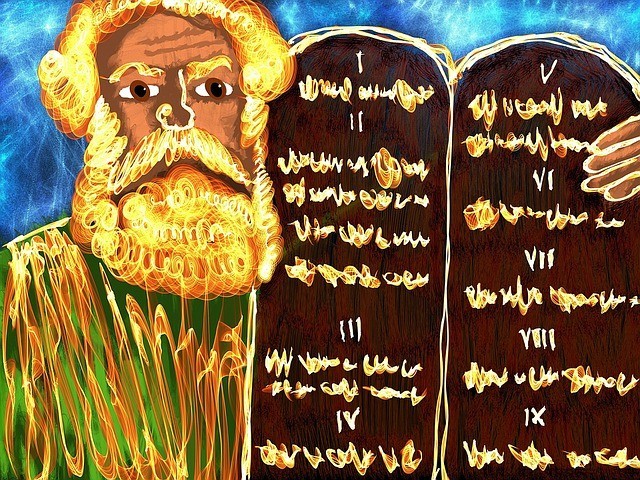
THE LAW WRITTEN IN OUR HEARTS
This is why we need Yahusha as it is he who helps fulfill the prophecy of the law also being written in our hearts:
Jer 31:33 But this shall be the covenant that I will make with the house of Israel (NOT WITH EVERYBODY); After those days, saith YAHUAH, I WILL PUT MY LAW IN THEIR INWARD PARTS, and write it (the law) in their hearts; and will be their Aluahym, and they shall be my people.
Eze 36:26-27 A new heart also will I give you, and a new spirit will I put within you: and I will take away the stony heart out of your flesh, and I will give you an heart of flesh. And I will put my spirit within you, AND CAUSE YOU TO WALK IN MY STATUTES, AND YE SHALL KEEP MY JUDGMENTS, AND DO THEM.
So obedience all starts with Yahusha. That is what Sha’ul was trying to say!
In other words, a true believer, the law and the Messiah are inseparable. That is why:
Isa 51:7 Hearken unto me, ye that know righteousness, the people in whose heart is my law; fear ye not the reproach of men, neither be ye afraid of their revilings.
What Yasha’Yahu (Isaiah) was saying here, is that those who know righteousness will be those who have the Father’s laws WRITTEN IN THEIR HEART! The covenants are inseparable and in the new covenant, the law is magnified from the letter to the spirit.
Both the law and the Messiah are needed for righteousness, which is why in the end, the hallmark of the true believers (saint) is one who obeys the Father’s commandments and believes in his son. Faith (belief) and obedience go hand-in-hand:
Rev 12:17 And the dragon was wroth with the woman, and went to make war with the remnant of her seed, which keep the commandments of YAHUAH (the law), and have the testimony (faith/belief) of Yahusha HaMashiach.
Rev 1:1 The Revelation of Yahusha HaMashiach which YAHUAH gave unto him, to shew unto his servants things which must shortly come to pass; and he sent and signified it by his angel unto his servant John:
Rev 1:2 Who bare record of the word of YAHUAH (the law), and of the testimony (belief/faith) of Yahusha HaMashiach, and of all things that he saw.Rev 14:12 Here is the patience of the saints (set apart/holy ones): here are they that keep the commandments of YAHUAH (the law), and the faith of Jesus.
Rev 22:14 Blessed are they that do his commandments (do his law), that they may have right to the tree of life, and may enter in through the gates into the city.
Got it? Faith without works is dead, but works without faith are dead (useless) works. That is all Sha’ul was trying to say.
WHAT IS THE PURPOSE OF THE LAW FOR A NEW COVENANT BELIEVER?
So what is the purpose of the law in our new covenant?
Answer: To show us what sin is so we can walk in righteousness, as the unrighteous shall not inherit the kingdom:
1Co 6:9-10 Know ye not that the unrighteous shall not inherit the kingdom of YAHUAH? Be not deceived: neither fornicators, nor idolaters, nor adulterers, nor effeminate, nor abusers of themselves with mankind, Nor thieves, nor covetous, nor drunkards, nor revilers, nor extortioners, shall inherit the kingdom of YAHUAH.
Now stop and ask yourself, if the unrighteous (sinners) cannot enter the kingdom, and the law shows us what sin is, after being justified through faith in Messiah, if I do not obey the law, how then can I be seen as righteous before YAHUAH?
In reality, we first believe in the Messiah, and as a result, we are able to walk in newness of life in obedience to the law, just so we do not sin. In other words, we will walk as the Messiah walked (1 John 2:6).
JUSTIFIED BY FAITH WITHOUT THE DEEDS OF THE LAW
We are justified by faith without the deeds of the law, but that does not mean we are to then ignore the law and walk in sin!
Now concrete proof (again) that we must walk in obebdience to the law (not sin) when we follow Yahusha:
1 Jn 2:29 If ye know that he is righteous, ye know that every one that doeth righteousness is born of him.
We must walk in righteousness!
We do not justify ourselves that we are keeping rules (for then we can boast in our accomplishment), but rather we believe in him, which leads us to walk as he walked (1 John 2:6), which is in righteousness and obedience to the law (so we are not sinners).
In fact, all I have said in this post is summarized right here in these 3 verses:
Eph 2:8-10 For by grace are ye saved through faith; and that not of yourselves: it is the gift of YAHUAH:
Not of works (of the law), lest any man should boast.
For we are his workmanship, created in Messiah Yahusha (transformed through belief) unto good works (obedience to the law through a converted heart, which leads us to do good out of transformed hearts), which YAHUAH hath before ordained that we should walk in them.
This is such an easy concept to understand, yet because of the Christian religion, most of us find it reprehensible to even mention obeying any law.
WORKERS OF LAWLESSNESS
Sadly, this is because they have accepted the lawless Messiah called Jesus Christ, the one who comes with all signs and lying wonders. He is the one who leads the strong delusion of Christianity. See 2 Thess 2:1-12.
And so this post is sure evidence of this verse: my people are destroyed for lack of knowledge (because you do not seek knowledge). See Hosea 4:6.
The truth is as we have been saying, the covenants merge beautifully with each other, so we must obey the law, or we sin.
But many of the followers of Christianity are hell-bent on continuing in sin, in finding an excuse to sin, in finding a way to live in sin and assure themselves they are doing the right thing.
At the same time, they denounce those who strive to walk in obedience to the Father through his son, as the Bible says the end time believers would do (Rev 14:12). In other words, wrong becomes right and right becomes wrong (Isa 5:20).
Sadly, this is what awaits those of us who have this attitude:
Mat 7:22-23 On that day many will say to me, ‘Master, Master, did we not prophesy in your name, and cast out demons in your name, and do many mighty works in your name?’ And then will I declare to them, ‘I never knew you; depart from me, you workers of lawlessness.’
WHAT DOES IT MEAN TO OBEY THE LAW?
However, when we speak of obeying the law, are we to still sacrifice animals? Do we stone people who commit certain sins? What exactly do we mean by obeying the law? How exactly does the law merge with the new covenant?
That is what we will look at in part 3. In Part 3, we are going to show what part of the law was magnified (not abolished) in the Messiah. Hence, we will see which part of the law has been transposed, and therefore what has been “amended” to make way for the Messiah. Bottom line? We will see what we mean by obeying the law in our new covenant.
Hence, let us now move on to part 3 and look at Hebrews 8:13 and the question of what exactly is ready to vanish away.
Missed out on part 1? All 3 posts work together to give a better understanding so check out:


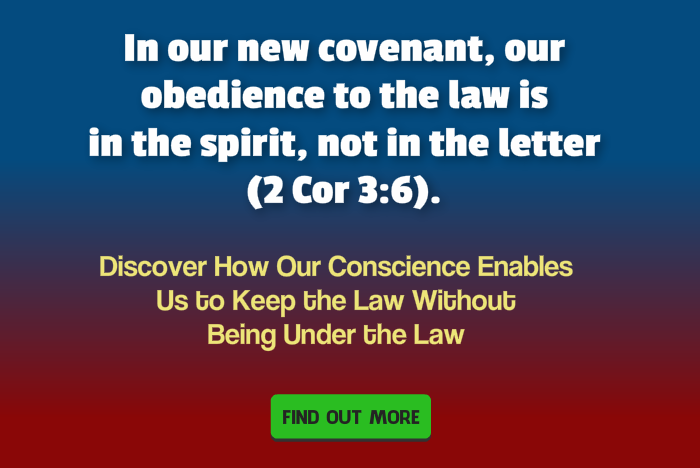


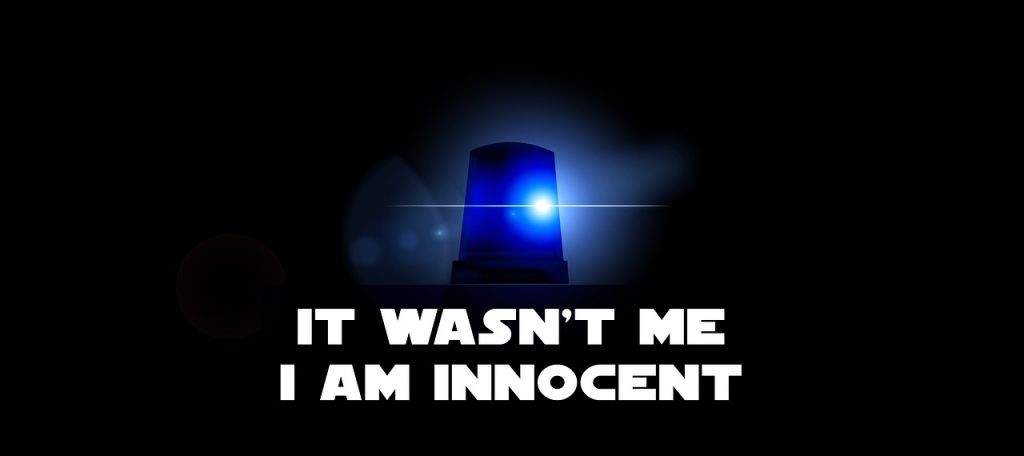
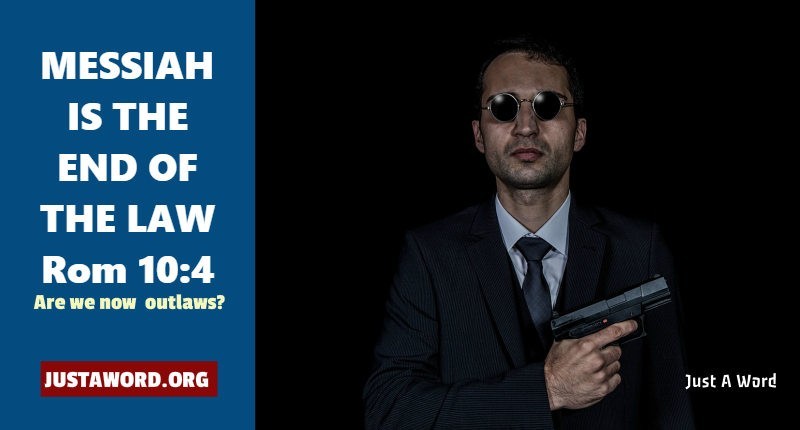
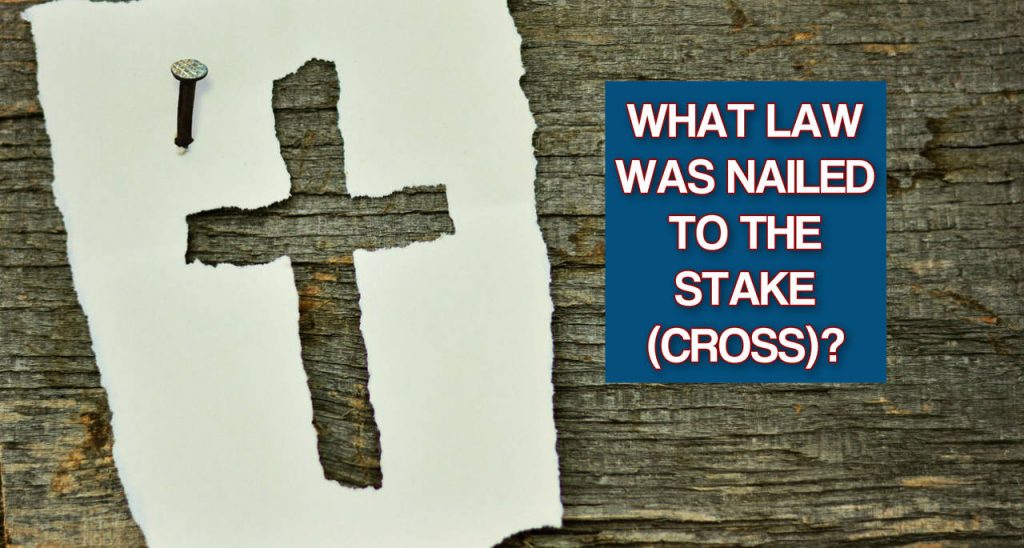
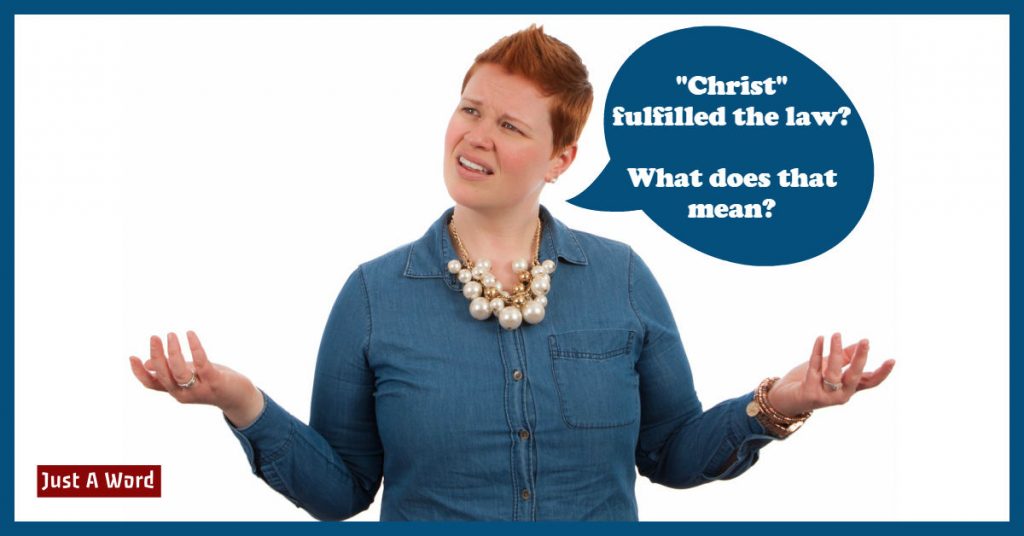
Pingback: The Cost Of Discipleship: Meaning and Implications: Why Most OF Us Fail!!! - Just a Word